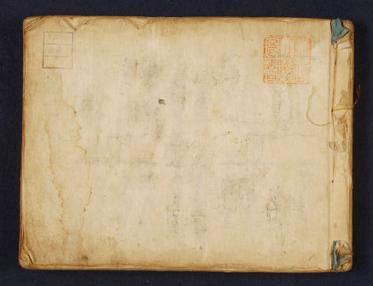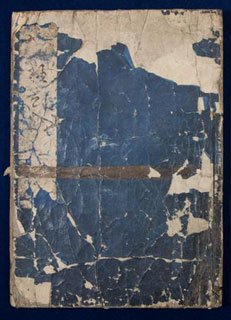Kyōgen
Kyōgen scripts have two types: scripts for ai-kyōgen, an interlude performed during nō plays, and hon-kyōgen, independent kyōgen plays. Unlike nō, kyōgen is less text-based, and had neither detailed written texts nor authorized scripts by iemoto (heads of the schools) until the 17th century. Tenshō kyōgenbon (16th century), the earliest extant script today, includes simple plot summaries rather than word-by-word transcription of the lines spoken on stage. What can be called scripts today were not available until Ōkura Torakiyo (1566-1646) and his son Tora’akira (1597-1662) compiled books that included detailed dialogue and stage directions. The writing of treatises also started around this era with Tora’akira. This limited emphasis on text is related to kyōgen’s original nature which incorporates improvisation, vernacular locutions, or popular songs of the day into the performance. While authorized kyōgen scripts in later years reveal the formalization of performance, illustrated kyōgen texts were also published by non-mainstream practitioners, indicating the popularity of kyōgen.
-
- Title:
- Tenshō Kyōgen Book
- Title (jp):
- Tenshō kyōgenbon 天正狂言本
- Description:
- 16.2 x 21.1 cm (yokohon), fukurotoji binding. This is the oldest extant book of kyōgen, written in 1578 (Tenshō 6). Rather than complete scripts, it records plot summaries and tips for the performance of 104 kyōgen plays. The book also includes plays that are no longer performed or whose plots are different from those with the same titles today.
- Collection name:
- Noh Theatre Research Institute
- Volume:
- 1
-
- Title:
- Illustrated Script of Kyōgen
- Title (jp):
- Kyōgenki 狂言記
- Description:
- Woodblock print, minobon, fukurotoji binding. 26.8 x 19.1 cm for Volumes 1, 2, and 4, and 26.8 x 19.5 cm for Volumes 3 and 5. In each volume, the book contains a list of ten play titles, the number of actors, costumes, and stage props needed for performances, and the playscript. At the end of each play is inserted an illustration which includes not only performers but also the audience. Reprinted from a late 17th-century woodblock.
- Collection name:
- Hosei University Kōzan Collection
- Volume:
- 5
- View all



